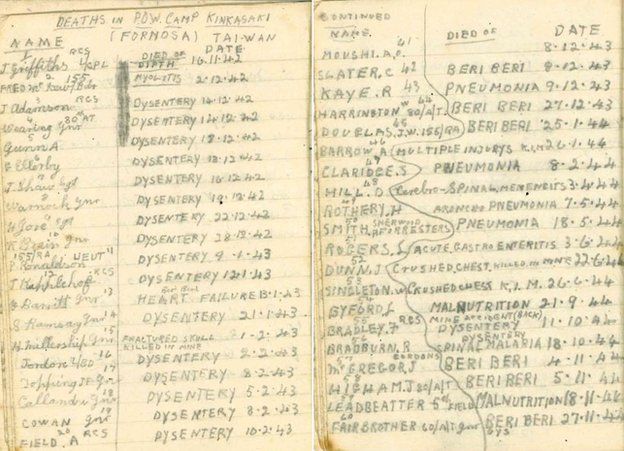Burma POW's diary reveals suffering and starvation
- Published

Bob Reynolds spent four years as a prisoner of war in Burma and Taiwan. Unbeknown to his captors, and at the risk of losing his life if discovered, he kept a diary documenting life in the camp and the deaths of his friends. Now his family has shared his account.
Bob Reynolds' diary is little more than a tattered notebook.
The pages are yellowed, many have fallen loose and others are marked with rust from the two thin metal staples holding it together.
But written on the lined pages, in a mixture of fading pencil and pen ink, is a story of life and death.
Bob, a 26-year-old miner who joined the military as a driver, was captured by the Japanese in 1941 and spent the following four years in a prisoner of war camp in Burma and Taiwan.
If his diary had been discovered he would almost certainly have been shot on the spot says his nephew Tom Harrison.
"He kept it so he could record what happened to him and his friends," Mr Harrison told BBC Tees.
"It was a sign of his hope that he would one day get out of there and be able to tell the world what they had been through.
"It was a record of the atrocities suffered by the prisoners - he called it The Book of Happenings.
"The families of his friends, if they don't know what happened to their loved ones it can be verified with this diary and how they died.
"There's name after name and what they died of.
"He didn't even have to be in the war, he was a miner which was a protected job, but he joined up because he wanted to do his part."
With its minute handwriting and often graphic portrayal of the ordeal suffered by the prisoners, the diary is not an easy read.
Bob talks of meagre food rations, brutal torture at the hands of the guards and, poignantly, of the deaths of his fellow prisoners.
"They all suffered, they were starved, tortured," said Mr Harrison.
"There are stories about people being deliberately blown up because they couldn't work.
"They stole corn beef and had to eat it all in one night. One of them died, his stomach burst he ate that much - force fed himself.
"They killed a guard dog, skinned it and ate it.
"What they went through was unbelievable, it was all true though.
"I've seen the marks on his body where they stubbed cigarettes, the scar on his back where they hit him with a blade, where they made them hold buckets of water out in your hands until you couldn't hold it anymore and dropped."
Causes of death recorded in the diary included dysentery, heart failure, pneumonia, malaria and starvation, not to mention injuries suffered at the hands of guards or gruelling manual labour.
Bob recorded one comrade dying from a fractured skull suffered in a mine while another was killed when his chest was crushed.
The diarist himself was nearly blind through malnutrition and, according to his soldier's service book, had malaria four times.
"A lot of the prisoners wouldn't give in," said Mr Harrison, "and they were beaten and beaten until they did give in, they were starved.
"You can see from the diary how many died of dysentery and malnutrition.
"They didn't get any treatment, they were just left."
On 15 August, 1945, the war was officially over, the camp was liberated and Bob was sent to a hospital to recuperate.
The 5ft 9in (175cm) miner, who had weighed 12 stone when he enlisted in 1940, weighed just six and a half stone.
On his return to North Ormseby near Middlesbrough, he attempted to settle back in to an ordinary life.
He started out on building sites, but the injuries he had suffered in the camps made him unable to cope with the physicality of the job, so he became a taxi driver.
He died in 1990 at the age of 75.
But the memories of his incarceration never left him, his nephew said.
"He couldn't forget it, the worst thing was when he got drunk he was a lunatic, he would talk broken Japanese and go crazy in the house.
"He wouldn't talk about it when he was sober, but you could see his head wandering when he had had a pint, and then it was terrible to see him suffer.
"And his family suffered as well, no-one ever talks about what it's like for the family to cope with someone who has suffered so terribly.
"There was no treatment for these people then, not like there is now, they were just left to sort it out themselves.
"He was that scarred he was in a different world because of what he went through."
- Published16 August 2015
- Published15 August 2015
- Published15 August 2015
- Published15 August 2015